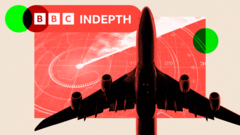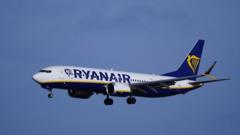Researchers, known as the "Time Lords," are racing to innovate reliable alternatives to GPS, ensuring national security and everyday navigation amid rising interference.
The 'Time Lords': UK's Innovative Response to GPS Jamming Threats

The 'Time Lords': UK's Innovative Response to GPS Jamming Threats
As GPS jamming incidents surge, British scientists are developing cutting-edge atomic clocks to safeguard navigation and timing.
On January 17, a Ryanair flight from London to Vilnius faced an unexpected and alarming situation as it prepared to land. Moments before touching down, the aircraft encountered critical interference with its Global Positioning System (GPS) signals, forcing an emergency diversion to Warsaw, Poland. Lithuanian authorities later confirmed the incident as a case of "GPS signal interference," part of a troubling trend affecting aviation safety in the region.
Over the past few months, more than 800 instances of GPS interference have been documented in Lithuanian airspace alone, raising alarms across Estonia and Finland. They have accused Russia of employing jamming technologies near NATO's eastern borders, a claim that the nation vehemently denies. The risk associated with disrupted GPS extends well beyond aviation; a 2017 report indicated that widespread GPS jamming could cripple the UK's financial, electricity, and communication infrastructures, with potential losses estimated at £1.4 billion daily.
In response to this pressing threat, the UK government has mobilized scientists, dubbed the "Time Lords," to develop secure alternatives to GPS. The ambitious goal is to create portable atomic clocks that do not rely on vulnerable satellite signals. However, transforming this vision into reality is a monumental task that necessitates advancements in atomic clock technology and changing the conventional understanding of time.
This endeavor parallels the groundbreaking achievements of John Harrison in the 18th century when he invented a portable clock for maritime navigation, revolutionizing global trade and exploration. Today, researchers are pursuing advancements that could similarly transform navigation and timing systems, with experts like Dr. Helen Margolis from the National Physical Laboratory (NPL) highlighting the significant societal shifts that follow improvements in time measurement.
The scientific foundation for this effort is rooted in quantum technologies, specifically the development of more accurate atomic clocks. The NPL is perfecting an optical clock, which outmatches current caesium clocks in precision. This new technology aims to redefine how we measure time and could enable a national atomic clock network by 2030, essential for applications in finance, telecommunications, and national security.
The initiative is already witnessing progress, with recent test flights demonstrating the potential of quantum-enabled navigation systems. Despite the technological hurdles ahead, including miniaturizing these systems for everyday use, scientists are optimistic about achieving breakthroughs within the next few years.
As GPS jamming poses increasing threats, especially to military operations in conflict zones like Ukraine, the urgency for innovative solutions only escalates. The "Time Lords" are at the forefront of this challenge, echoing the historic journey of precision navigation and striving to craft a future where every individual can rely on secure and accurate navigational systems.
The research landscape indicates a robust commitment to overcoming obstacles similar to those faced by John Harrison centuries earlier. As the urgency grows, can today's scientists replicate that historic breakthrough? The legacy of the "Time Lords" serves as a crucial reminder of the fundamental need for precise timekeeping in navigating our modern world.























